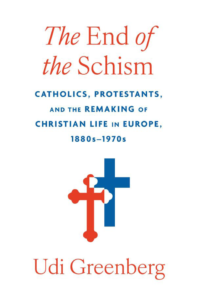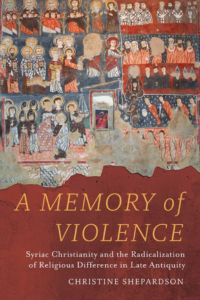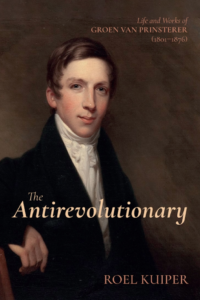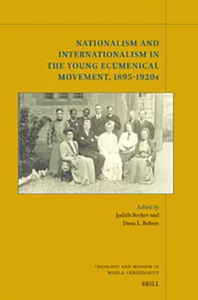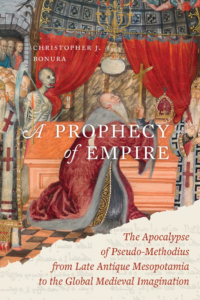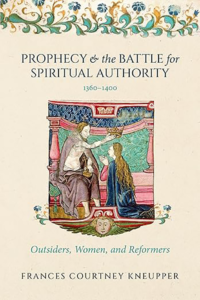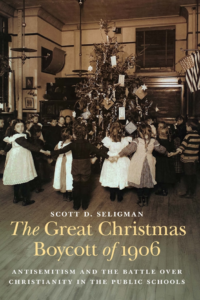Monthly Updates on Recent Books in the History of Christianity
To raise awareness of recent books in the history of Christianity, the editorial staff of Church History: Studies in Christianity and Culture highlights each month a list of 10-15 books in diverse periods and geographical regions that we hope will be of interest to our members. We include here below the monthly list for September 2025, chosen by our staff, with excerpts from the publishers’ blurbs.
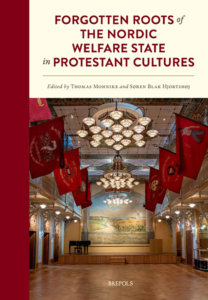
Thomas Mohnike and Søren Blak Hjortshøj, eds., Forgotten Roots of the Nordic Welfare State in Protestant Cultures, 2025
The Nordic welfare state of the 20th century has been hailed around the world as a model of how to build democratic and egalitarian societies. It has often been described as a project of social democracy, often following a narrative of secularization and rationalization of society. However, some of the most important actors and ideas of the "Scandinavian Sonderweg" had their roots in Protestant, often Pietist and revivalist milieus that dreamed of creating an egalitarian community. The present volume explores these often forgotten roots in several case studies of phenomena from the seventeenth to the twenty-first century, focusing primarily on questioning the function of aesthetics in the creation of the welfare state model. We argue that aesthetics and what Friedrich Schiller called aesthetic education played an important, unifying role for Nordic societies. These aesthetics were shaped by Protestant ideas and practices. Through references to the then widespread circulation of educational texts based on Luther's catechism, the later pietistic catechism of Erik Pontoppidan, Nordic hymnbooks, and practices such as communal singing and preaching in church, church coffee, reading circles, and conventicle meetings, a common aesthetic language emerged that unified different social groups and their competing goals and claims. Civic actors and movements learned specific ways to engage in society, to develop practices of internalizing responsibility, (self)critique, and accountability, and to communicate and develop a more democratic modern civic sphere. We therefore propose to look at this history from the perspective of a historically changing aesthetic as an integrating principle for understanding the political, social, cultural, economic and many other aspects of the Nordic welfare state.
Udi Greenberg, The End of the Schism: Catholics, Protestants, and the Remaking of Christian Life in Europe, 1880s–1970s, 2025
For centuries, Europe’s Catholics and Protestants were bitter rivals, each group blaming the other for violence and alleged moral decline. Yet starting in the 1930s, they swiftly made peace, abandoning old stereotypes and even forming joint political parties and social organizations. Why did these erstwhile adversaries suddenly start cooperating, and what were the consequences?
A groundbreaking study, The End of the Schism overturns conventional wisdom about this revolutionary change. Udi Greenberg shows that ecumenism did not grow out of mutual tolerance. Rather, Christian thinkers and politicians on both sides of the Catholic-Protestant divide came together to contain what they considered growing threats to Christian life: socialism, feminism, and Afro-Asian liberation movements. This project of interconfessional peacemaking accelerated with the rise of the Nazis, whose call for religious unity sparked intense debates among Christian denominations about their relationships with one another. Their rapprochement culminated in the unfolding of the Cold War and decolonization, when Catholic and Protestant authorities formally declared each other “brethren in faith.”
The End of the Schism makes clear the enormous consequences of the ecumenical revolution. By working together, Catholics and Protestants were able to design Europe’s economic policies, regulate its sexual practices, and deeply shape its postwar relationship with the Global South. As confessional attachments in Europe have weakened, this coalition of Christians has only grown more cohesive, leveraging their alliance to maintain influence across a politically fractured continent.
Christine Shepardson, A Memory of Violence: Syriac Christianity and the Radicalization of Religious Difference in Late Antiquity, 2025
University of California Press
Through the fifth and sixth centuries, major divisions rocked Christianity as different factions vied to make their teachings the doctrine of the Roman Empire’s imperial church. In the aftermath of the Council of Chalcedon in 451, miaphysite Christians, often targeted as heretics by the imperial church, confronted periodic violence and persecution. In this book, Christine Shepardson reshapes our understanding of late antiquity by centering Syriac Christianity in these complex and politicized doctrinal conflicts. Drawing on critical studies of violence and memory, she traces narratives of resistance and other rhetorical strategies by which miaphysite leaders radicalized their followers to endure physical deprivation and harm rather than abandon their church community.
Roel Kuiper, The Antirevolutionary: Life and Works of Groen van Prinsterer (1801–1876), 2025
Groen van Prinsterer (1801-1876), born in an aristocratic family, became a dedicated Protestant in his younger years and one of the leaders of Dutch and European Christianity, gaining an influential role as pioneer in international Christian thought and parliamentary action. He criticized the secular ideas of the French Revolution in his Unbelief and Revolution (1847). This book has been (and still is) widely read. Two years later he was elected in the Dutch parliament, where he became the leader of his Antirevolutionary Party. He fought for Christian education and democratic rights. As a historian he wrote several books highlighting the merits of the Reformation and God's guidance in the lives of the nations. He became the spiritual father of many Christian leaders, especially of Abraham Kuyper, who shaped this Protestant political movement to be one of the most influential in Dutch history. His legacy shaped thinkers like Herman Bavinck and Herman Dooyeweerd, the founder of reformational philosophy.
Judith Becker and Dana L. Robert, Nationalism and Internationalism in the Young Ecumenical Movement, 1895-1920s, 2025
This book explores how and why global Protestant movements have been foundational for studies of internationalism. During the early twentieth century, hopes for the peaceful coexistence of nations animated emerging international Protestant cooperation. Despite national hostilities including world war, commitment to global Christian fellowship became an urgent public agenda. In this volume, essays by European, Asian, and North American scholars locate the essence of the “young ecumenical movement" in the dynamic tension between nationalism and internationalism during the early twentieth century. Political crises, crushing disappointments, and imperialist ambitions notwithstanding, transnational Protestant leaders, networks, and movements envisioned Christianity as a contemporary multi-cultural, worldwide community.
Christopher J. Bonura, A Prophecy of Empire: The Apocalypse of Pseudo-Methodius from Late Antique Mesopotamia to the Global Medieval Imagination, 2025
University of California Press
The Apocalypse of Pseudo-Methodius was one of the medieval world’s most popular and widely translated texts. Composed in Syriac in Mesopotamia in the seventh century, this supposed revelation presented a new, salvific role for the Roman Empire, whose last emperor, it prophesied, would help bring about the end of the ages. In this first book-length study of Pseudo-Methodius, Christopher J. Bonura uncovers the under-appreciated Syriac origins of this apocalyptic tract, revealing it as a remarkable response to political realities faced by Christians living under a new Islamic regime. Tracing the spread of Pseudo-Methodius from the early medieval Mediterranean to its dissemination via the printing presses of early modern Europe, Bonura then demonstrates how different cultures used this new vision of empire’s role in the end times to reconfigure their own realities. The book also features a new, complete, and annotated English translation of the Syriac text of Pseudo-Methodius.
Frances Courtney Kneupper, Prophecy and the Battle for Spiritual Authority, 1360–1400: Outsiders, Women, and Reformers, 2025
At the end of the fourteenth century, there was a surge of people who claimed to have the gift of prophecy. These individuals came from diverse backgrounds and included clergy members, princes, hermits, and illiterate laywomen. Their announcements of prophetic insights prompted reconsiderations of spiritual authority as the Middle Ages came to a close. People debated who could know the word of God and how such claims could be proven or disproven. This book explores three perspectives—those of prophets, their opponents, and their supporters. It first considers new types of people (women, outsiders, and reformers) who asserted prophetic gifts. In particular, the book highlights the way that women used prophecy to exert influence and challenge authority. It then discusses the adversaries of new prophetic claimants, who insinuated that prophecy was the product of demonic influence and therefore a hazard to the public. Finally, the book reveals the presence of an international network of clerical men who wrote in support of female prophecy, advocating for new voices. This book challenges the historical convention that clerical misogyny silenced women at the end of the Middle Ages, arguing that defenses for female prophecy had an enduring impact, affording spiritual authority to outsiders wishing to disrupt the status quo for centuries to come.
Scott D. Seligman, The Great Christmas Boycott of 1906: Antisemitism and the Battle over Christianity in the Public Schools, 2025
Today’s battles over Christianity in U.S. public schools have deep roots. In the nineteenth century it was an intramural struggle between Protestants and later-arriving Catholics. But at Christmastime in 1905, when Frank Harding, the Presbyterian principal of a Brooklyn elementary school, urged his Jewish students to be more like Jesus, the Jewish community entered the fray in a big way. It was just the trigger Orthodox Jewish activist Albert Lucas had been waiting for. Fresh from battling Christian settlement houses intent on converting Jewish children, Lucas accused the public schools of illegal proselytizing and called for Harding’s ouster.
After the Board of Education let Harding off in 1906 with a slap on the wrist and declined to clarify the rules governing religion in schools, New York’s Jews staged a boycott of school Christmas pageants in protest. The board’s concession to exclude sectarian hymns and religious compositions generated enormous antisemitic public backlash. Jews were accused of waging war on Christmas and of being less than true Americans.
The Great Christmas Boycott of 1906 traces the Christmas celebration dispute to the present day and describes how Jewish organizations of the twenty-first century, persuaded that politics are unlikely ever to permit a victory, seem to have reconciled themselves to the status quo and moved on to other, more winnable issues.
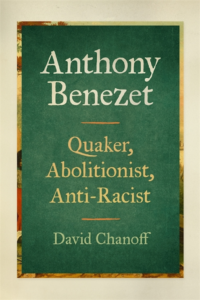
David Chanoff, Anthony Benezet: Quaker, Abolitionist, Anti-Racist, 2025
Wilberforce, Clarkson, Wesley. Britain’s great abolitionist activist Granville Sharp. Each of these consequential figures of the eighteenth-century Atlantic world were galvanized by the moral power of a modest Quaker teacher who never ventured more than a few miles from his home in Philadelphia: Anthony Benezet. While Benezet was buried in an unmarked grave, his fingerprints are all over the extinction of the Atlantic slave trade and the gathering strength of America’s own burgeoning abolitionist movement. He was a figure of global importance, “a saint,” Garry Wills called him, a great bearer to the rest of the world of the American ideals (no matter how compromised) of equality and liberty.
Anthony Benezet lived, by chance, at the nexus of radical Christianity and revolutionary democracy, and he fused the power of those two streams of morality in a way that changed lives and challenged political institutions so compellingly that the world became a different place because of him. But for all the magnitude of Benezet’s impact, he is largely unknown outside scholars of the period. He does not exist in any meaningful way in the widely read histories and biographies that define and amplify America’s historical consciousness.
In Anthony Benezet: Quaker, Abolitionist, Anti-Racist, preeminent biographer David Chanoff tells Benezet’s story—who he was, what he did, how he did it, and why it was that William Penn’s “Holy Experiment” of Pennsylvania provided the matrix for the historic transformation the abolitionist educator brought about. Indeed, Chanoff carves out a place for this forgotten American hero as a pioneering figure among those who launched American ideals onto the world stage.
Finally, for staying up-to-date on the latest titles in all fields, we recommend regularly perusing New Books Network and its "New Books in Christian Studies” page. These pages are updated regularly.

